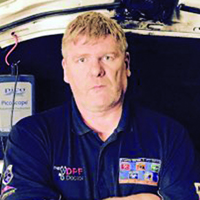In this article, PMM ’s team of outspoken garages take stock of where the industry is at, and the direction it is heading.
 Shaun Miller – Millers Garage
Shaun Miller – Millers Garage
Shaun is an IMI diagnostic technician with 15 years’ experience in the automotive industry, and was recently announced as runner up in 2017’s Top Technician competition
The skills shortage
2018 already…where has the time gone? I look back to my apprenticeship days in 2002 and I remember being full of hope, in a class of 30 or so young lads who were keen to learn how to fix cars. In those days, it seemed like everybody wanted to become a mechanic. Once qualified, I remember people applying for apprenticeships with my garage on a weekly basis and there simply weren’t enough jobs to go round. This was great for employers as they could have the pick of bunch and not have to pay big money.
Back in the present day, the apprentice that I recently took on sits in a class or four – and the other three are apparently only there because they are made to be. Now how on earth is this going to convince my apprentice that he has made a good choice of career?
“…the modern day technician is a completely different animal to his counterpart from years gone by.”
The problem is not just at apprentice level and this has been going on for some years. There is now a huge skills shortage in our industry, at all levels. I recently wanted to take a technician on at my garage and it took months to find a candidate worthy of employment. Obviously there are ways to attract technicians from other garages but that is a talk for another day!
So, why has this happened?
Our trade, in my opinion, has always been fairly low paid. Historically, and especially 20 or 30 years ago when technology wasn’t so advanced, the automotive trade was classed as a low skill industry that the naughty lads at school were sent to do.
Irrespective of whether this was a fair reflection or not, the modern day technician is a completely different animal to his counterpart from years gone by. Never before have we had to know so much about so many different systems, and on so many different vehicles. Our customers have no idea how complex cars are to fix these days, yet we are still regarded as a low skill industry, paid like a low skill industry and portrayed in the media as ‘Fred in the shed’ outfits. With the job becoming so complex, but without the requisite rise in pay, why would anybody want to join this line of work now?
I think the next five years will be tough and we will lose many technicians to other industries, which might result in the loss of some garages in the process. Whilst this is a shame, I truly believe the rewards will be there for those that persevere and dedicate their time to becoming the best technician they possibly can. Hopefully then, with fewer mechanics and fewer garages around, the market demand will drive up wages and perhaps the public perception of technicians will change and the industry will get the recognition it deserves.
 Dave Hill – London Road Garage
Dave Hill – London Road Garage
Dave has 33 years’ experience in the trade, and has owned and run London Road Garage in Coalville, Leicestershire since 2001, along with his wife Paula.
Duty of care – how far should it go?
No doubt we have all heard customers talk about their experience with dealerships and how they received a full vehicle health check when they only popped in to have a wiper blade fitted. To most of us in the independent sector, this seems like an over-eager, maybe even a desperate sales strategy imposed by the bean counters that dictate the way the big boys operate, but it has to be recognised that there is another important thing to consider – and that is the question of culpability when something goes wrong with a vehicle.
I recall an occasion when I had to take a customer’s car to the dealership, in order to deal with a failed component that they insisted had to be seen in their workshop. We dropped the car off and an hour later I get a call to inform me about the results of the free health check. Huh? I am a garage owner trying to sort warranty on a failed fan motor and now I feel my time is being wasted on an overzealous sales tactic. It took quite a while for me to step back and recognise that we already have similar processes that we operate in our workshop. For example, each time that we have a vehicle in for brake work, often with the customer’s specific comment that ‘the front brakes are grinding’, we will insist that a full brake inspection is carried out, including wheels and drums, and of course a steering/suspension check whilst the vehicle is off the deck.
“Maintaining control of the repair process from the moment the appointment is made, through to the handover of the keys, is of huge importance…”
To me this seems like a professional and prudent approach. Maintaining control of the repair process from the moment the appointment is made, through to the handover of the keys, is of huge importance and I find that insisting on doing it the right way (not necessarily the customer’s way), which includes the refusal of fitting their own parts, helps steer us away from unwelcome events and customers.
But how far should we take this ‘due diligence’ approach? Should we start doing light checks, washers/wipers and tyre pressure each time a car comes into the workshop? Is it really an example of an overzealous ‘looking for work’ style of trading, or is it simply the result of a detailed risk assessment that has filtered down from the upper echelons of the dealer networks?
 Steven Paterson – Krypton Garage & MOT Centre
Steven Paterson – Krypton Garage & MOT Centre
Steve is the head technician in a small three-generation family-run garage, with 30 years of experience under his belt.
Facing the challenges
With the speed that new technology on today’s vehicles is being rolled out, the question of how to meet the challenges this presents is one that every garage owner or technician should be considering. The last few years have seen a huge increase in the amount of technicians going down the specialist route, focusing on doing a professional job on just a few brands that they are comfortable with. On the flip side, there are also a lot of garages that have decided not to get involved with diagnostic work at all, due to the complexity involved in the modern car and the potential wasted hours trying to find faults that may never be found. Whatever the answer, garage owners need to start thinking creatively and adapting their business to meet the challenges head on.
“Whatever the answer, garage owners need to start thinking creatively and adapting their business to meet the challenges head on.”
Opportunity knocks
Many garages/workshops are already using the benefits of Block Exemption to enhance their business by completing jobs they couldn’t have done before, but with that coming to an end relatively soon, coupled with the introduction of telematics, DoIP and the ‘connected car’, is it time to start planning now for the changes that are coming? But what are the changes and how can we capitalise on them? Well, if we are to listen to and believe some of the information being reported in the media, we might as well close up shop now, amid rumours about the independent sector being shut out completely, diagnostic OBD ports being removed, and manufacturers generally closing their doors on access to information (the list goes on). I believe that this is, in the most part, being driven by certain companies that are trying to protect their own interests.
The truth is that information and data access has probably never been more available than it is right now, and I think it will only get better – at least for those willing to adapt to the changes that our industry is seeing. Manufacturers NEED us, let’s not forget this. They don’t have the manpower, resources and, more importantly, a big enough customer base that is willing to pay the prices they demand. As such, many of them are now taking advantage of allowing us access to information and tools, and I expect things to be better, not worse, in the coming years.
The days of DIY mechanics and ‘Fred in the shed’ type enterprises definitely look like they’re numbered, which should mean more work for serious, professional independents. Only time will tell.










